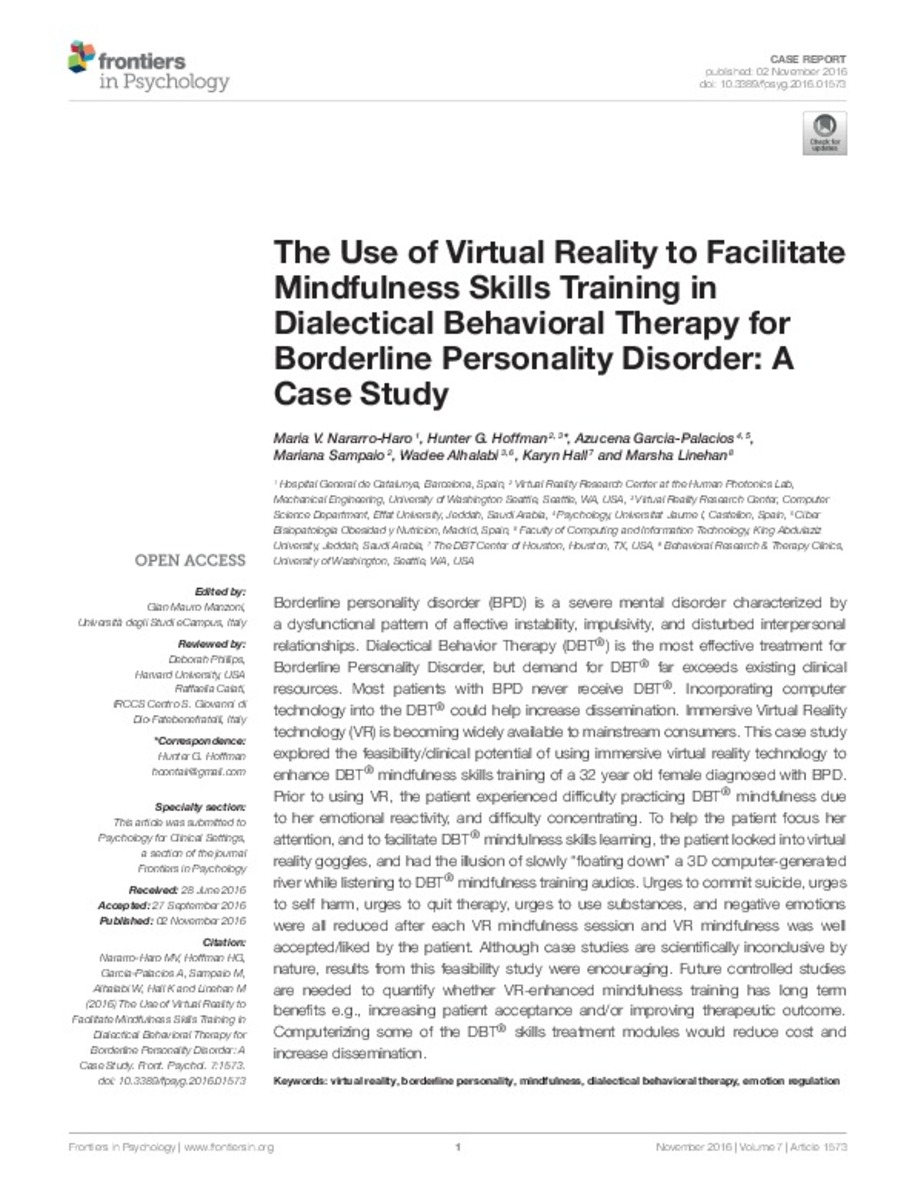Mostrar el registro sencillo del ítem
The Use of Virtual Reality to Facilitate Mindfulness Skills Training in Dialectical Behavioral Therapy for Borderline Personality Disorder: A Case Study.
| dc.contributor.author | Navarro Haro, Maria Vicenta | |
| dc.contributor.author | hoffman, hunter | |
| dc.contributor.author | Díaz-García, Amanda | |
| dc.contributor.author | Sampaio, Mariana | |
| dc.contributor.author | Alhalali, Wadee | |
| dc.contributor.author | Hall, Karyn | |
| dc.contributor.author | Linehan, Marsha | |
| dc.date.accessioned | 2017-01-30T12:15:49Z | |
| dc.date.available | 2017-01-30T12:15:49Z | |
| dc.date.issued | 2016-11-02 | |
| dc.identifier.citation | NAVARRO HARO, María Vicenta; HOFFMAN, H. G., GARCÍA PALACIOS, Azucena; SAMPAIO, M.; ALHALABI, W.; HALL, K.; LINEHAN, M. The Use of Virtual Reality to Facilitate Mindfulness Skills Training in Dialectical Behavioral Therapy for Borderline Personality Disorder: A Case Study. Frontiers in Psychology (2016), v. 7, pp. 1-9 | ca_CA |
| dc.identifier.uri | http://hdl.handle.net/10234/165728 | |
| dc.description.abstract | Borderline personality disorder (BPD) is a severe mental disorder characterized by a dysfunctional pattern of affective instability, impulsivity, and disturbed interpersonal relationships. Dialectical Behavior Therapy (DBT®) is the most effective treatment for Borderline Personality Disorder, but demand for DBT® far exceeds existing clinical resources. Most patients with BPD never receive DBT®. Incorporating computer technology into the DBT® could help increase dissemination. Immersive Virtual Reality technology (VR) is becoming widely available to mainstream consumers. This case study explored the feasibility/clinical potential of using immersive virtual reality technology to enhance DBT® mindfulness skills training of a 32 year old female diagnosed with BPD. Prior to using VR, the patient experienced difficulty practicing DBT® mindfulness due to her emotional reactivity, and difficulty concentrating. To help the patient focus her attention, and to facilitate DBT® mindfulness skills learning, the patient looked into virtual reality goggles, and had the illusion of slowly “floating down” a 3D computer-generated river while listening to DBT® mindfulness training audios. Urges to commit suicide, urges to self harm, urges to quit therapy, urges to use substances, and negative emotions were all reduced after each VR mindfulness session and VR mindfulness was well accepted/liked by the patient. Although case studies are scientifically inconclusive by nature, results from this feasibility study were encouraging. Future controlled studies are needed to quantify whether VR-enhanced mindfulness training has long term benefits e.g., increasing patient acceptance and/or improving therapeutic outcome. Computerizing some of the DBT® skills treatment modules would reduce cost and increase dissemination. | ca_CA |
| dc.description.sponsorShip | This research was supported by Effat University, Jeddah Saudi Arabia Research and Consultancy Institute. | ca_CA |
| dc.format.extent | 9 p. | ca_CA |
| dc.format.mimetype | application/pdf | ca_CA |
| dc.language.iso | eng | ca_CA |
| dc.publisher | Frontiers Media | ca_CA |
| dc.relation.isPartOf | Frontiers in Psychology (2016), v. 7 | ca_CA |
| dc.rights | Atribución-NoComercial-SinDerivadas 4.0 España | * |
| dc.rights.uri | http://creativecommons.org/licenses/by-nc-nd/4.0/ | * |
| dc.subject | Virtual reality | ca_CA |
| dc.subject | Border line personality | ca_CA |
| dc.subject | Mindfulness | ca_CA |
| dc.subject | Dialectical behavioral therapy | ca_CA |
| dc.subject | Emotion regulation | ca_CA |
| dc.title | The Use of Virtual Reality to Facilitate Mindfulness Skills Training in Dialectical Behavioral Therapy for Borderline Personality Disorder: A Case Study. | ca_CA |
| dc.type | info:eu-repo/semantics/article | ca_CA |
| dc.identifier.doi | http://dx.doi.org/10.3389/fpsyg.2016.01573 | |
| dc.rights.accessRights | info:eu-repo/semantics/openAccess | ca_CA |
| dc.relation.publisherVersion | http://journal.frontiersin.org/article/10.3389/fpsyg.2016.01573/full | ca_CA |
| dc.type.version | info:eu-repo/semantics/publishedVersion | ca_CA |
Ficheros en el ítem
Este ítem aparece en la(s) siguiente(s) colección(ones)
-
PSB_Articles [1303]
Articles de publicacions periòdiques








